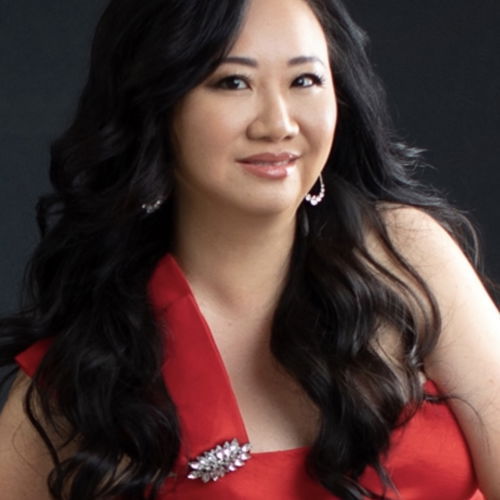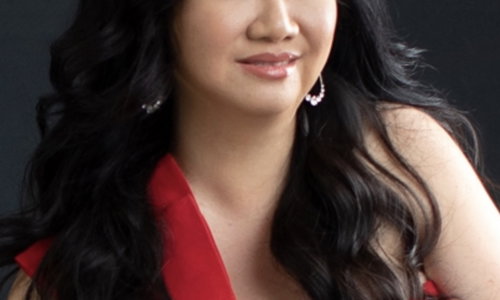Echoes of Voice, Viola and Piano
Details
Shirley (Xiao-Ling) Wang full profile / Voice, viola and piano / 3 musicians
Other players: Shirley Wang, June Xu and Apple Lin
Full program notes
Echoes of Voice, Viola and Piano
An Evening of Chamber Music
Featuring works by Brahms, Bruch, Clara Schumann, Bernstein, Massenet, Strauss, Schumann, and Frank Bridge
⸻
PROGRAM
Johannes Brahms – Two Songs for Voice, Viola, and Piano, Op. 91
1. “Gestillte Sehnsucht”
2. “Geistliches Wiegenlied”
Max Bruch – Romanze in F major, Op. 85
(for viola and piano)
Clara Schumann – Three Songs from Op. 12
No. 2 – “Er ist gekommen in Sturm und Regen”
No. 4 – “Liebst du um Schönheit”
No. 11 – “Warum willst du and’re fragen?”
Leonard Bernstein – Dream With Me
INTERMISSION
Jules Massenet – Élégie
(arr. for voice, viola, and piano by Lindsey Link Harnsberger)
Richard Strauss – Three Songs
1. “Morgan”, Op. 27 No. 4
2. “Die Nacht”, Op. 10 No. 3
3. “Zueignung”, Op. 10 No. 1
Robert Schumann – Adagio and Allegro, Op. 70
(for viola and piano)
Frank Bridge – Three Songs for Voice, Viola, and Piano
1. “Far, far from each other”
2. “Where is it that our soul doth go?”
3. “Music, when soft voices die”
Historical context
Echoes of Voice, Viola and Piano
A Program Rooted in Intimacy, Reflection, and Transformation
This concert program traces a lyrical arc across the 19th and early 20th centuries, centered on repertoire that gives rare prominence to the combination of voice, viola, and piano—a chamber ensemble that evokes introspection, warmth, and deeply human resonance.
The program opens with Johannes Brahms’ Op. 91, a landmark duo of songs composed for his close friends Joseph Joachim and Amalie Schneeweiss. In these pieces, Brahms elevates the viola to a singing partner with the voice, reflecting both his fascination with inner textures and his personal connection to the couple’s troubled marriage. The result is a poetic balance of spiritual yearning (Gestillte Sehnsucht) and maternal devotion (Geistliches Wiegenlied), making it one of the earliest and most enduring works for this ensemble.
Max Bruch’s Romanze continues the lyrical expression, though in a purely instrumental form. Written in 1911 for the German violist Maurice Vieux, it reflects the composer’s gift for song-like phrasing and his late-Romantic sensibility. Despite being lesser known than Bruch’s violin works, the Romanze has become a staple of the viola repertoire—its long lines and rich harmony offering a meditative bridge to the vocal songs that follow.
Clara Schumann’s Op. 12 songs come from a joint publication with her husband, Robert, during a fertile and passionate year of their early marriage. These particular selections showcase her intimate and refined compositional voice—rooted in Lied tradition but colored with her unique emotional economy. Her choice of poetic texts speaks to themes of storm, beauty, and inner searching, subtly asserting her own compositional voice within a male-dominated musical world.
Leonard Bernstein’s Dream With Me (originally written for Peter Pan) infuses the program with 20th-century American warmth and theatrical poignancy. The work is delicate and nostalgic, and its inclusion here suggests a longing for innocence and a gentle crossing between concert song and musical theatre tradition.
INTERMISSION
After the break, we return with Jules Massenet’s Élégie, a French art song originally composed for cello and piano and later arranged for many configurations—including this version for voice, viola, and piano. Its flowing, melancholic line and sentimental text capture the Belle Époque’s obsession with beauty, death, and longing.
Next, Richard Strauss’s three songs—Morgan, Die Nacht, and Zueignung—span different phases of his early song output, united by a lush harmonic palette and a gift for suspended emotional nuance. These selections offer a sweeping romantic gesture: from the nocturnal mystery of Die Nacht, to the eternal promise of Morgan, to the radiant affirmation of Zueignung. Together, they form an emotionally saturated mini-cycle that brings the viola into an enriched harmonic conversation with voice and piano.
Robert Schumann’s Adagio and Allegro, Op. 70, was originally composed for horn and piano, but quickly adopted into the viola repertoire for its expressive breadth and technical agility. Composed during a period of creative vitality in Dresden, it reflects both lyrical intensity and rhythmic vigor—qualities that highlight Schumann’s dual nature as a composer of inner worlds and outer contrasts.
The program concludes with Frank Bridge’s Three Songs for Voice, Viola, and Piano, a rarely performed gem that merges English impressionism with poetic introspection. Written around 1907, these songs reflect Bridge’s sensitive harmonic language and his gift for setting poetry with subtle shifts in texture. The texts, drawn from Shelley and other Romantic poets, provide a fitting end: they meditate on distance, the soul, and the persistent resonance of music even after voices fade—perfectly encapsulating the concert’s title: Echoes of Voice, Viola and Piano.
Videos from this player
Other programs from this ensemble
Schubertiade, Voice & Guitar Duo/Solos
- Musician profile: Shirley (Xiao-Ling) Wang
-
Instruments: Voice and guitar
- Musicians: Shirley (Xiao-Ling) Wang, Eric Coffey
- Musician profile: Shirley (Xiao-Ling) Wang
-
Instruments: Erhu, Guzheng and Western Operatic Voice
- Musicians: Shirley (Xiao-Ling) Wang, XiaoBo Li (Erhu), Su She (guzheng), Shirley Wang, Western Operatic Soprano
- Musician profile: Shirley (Xiao-Ling) Wang
-
Instruments: 2 vocalists and a pianist
- Musicians: Shirley (Xiao-Ling) Wang, Hui Wu, pianist & Sherry Shaoling, vocalist

 Continue with Facebook
Continue with Facebook
 Continue with Google
Continue with Google
 Continue with Apple
Continue with Apple

